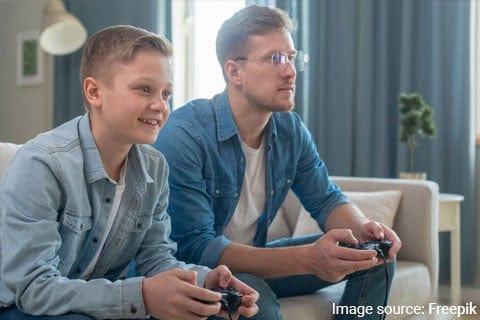Video games have evolved significantly, encompassing various genres that offer distinct cognitive and mental health benefits. Recent studies have explored how different video game types influence brain activity, cognitive processes, and overall mental health outcomes. This literature review examines three key articles that delve into these impacts: the cognitive effects of different video game genres, the therapeutic use of commercial video games in mental health, and how veterans use video games for recovery.
Article #1: Co-Activation Patterns During Viewing of Different Video Game Genres (Cui et al., 2024)
Purpose of the Study
This study investigated the cognitive effects of different video game genres on cortical networks, expanding upon previous research focused primarily on traditional action-like video games. The researchers aimed to examine how the brain’s co-activation patterns differ when viewing various genres of games, including action real-time strategy games (ARSGs), first-person shooters (FPS), and life simulation games (LSGs).
Sample
The study recruited 71 healthy, right-handed adults from the University of Electronic Science and Technology of China (UESTC). Participants were screened for normal vision and hearing, no history of neurological illnesses, and no symptoms of internet gaming disorder.
Method
Participants played three different games: Sims 4 (LSG), League of Legends (ARSG), and Call of Duty Online (FPS). The FPS and ARSG were considered action-like games, while LSG served as a control due to its lower cognitive workload. Participants played each game actively for 30 minutes and, after a ten-day interval, watched their recorded gameplay in a passive viewing task. Brain activity during passive viewing was measured using MRI and Co-Activation Pattern (CAP) analysis.
Results
The study revealed significant differences in brain activity across primary and higher-order networks when viewing action-like games compared to the control LSG. FPS games increased sensorimotor processing, while ARSGs enhanced attentional control. Viewing video games also decreased brain activity in areas related to risk-taking, emotion, reward, and social cognition.
Conclusion
This study demonstrated dynamic variations in brain network activity across different game genres, highlighting how action-like games uniquely engage cognitive functions compared to less demanding genres.
Article #2: Commercial Video Games as a Resource for Mental Health (Boldi & Rapp, 2021)
Purpose of the Study
This systematic literature review aimed to assess how commercial video games are utilized as mental health interventions across diverse populations and disorders, including ASD, mood disorders, neurocognitive disorders, and PTSD.
Sample
The review included 39 articles covering a wide range of mental health conditions, such as neurodevelopmental disorders (ASD and developmental dyslexia), mood disorders (depression and anxiety), neurocognitive disorders, and PTSD.
Method
The studies used various approaches, including qualitative interviews, case studies, quantitative experiments, surveys, and mixed-method research.
Results
Video games were shown to offer numerous benefits, such as improving social and cognitive skills in ASD patients, providing cognitive stimulation for neurocognitive disorders, and offering a sense of control and stress relief for PTSD patients. They were also noted for their cost-effectiveness and fewer side effects compared to traditional pharmacological treatments. However, potential negative effects like problematic gaming and reduced real-world interactions were also highlighted.
Conclusion
While video games can offer significant mental health benefits, the review emphasized the importance of individualizing treatment to avoid potential downsides, such as gaming addiction or escapism.
Article #3: Video Game Play and Mental Health Recovery in Veterans (Carras et al., 2018)
Purpose of the Study
This qualitative study explored how military veterans used video games to aid their mental and behavioral health recovery, particularly focusing on veterans treated for mental health issues.
Sample
The study included 20 U.S. military veterans, aged 25 to 62, who were habitual gamers, playing for seven or more hours weekly. Most participants reported PTSD or trauma-related symptoms.
Method
Semi-structured interviews were conducted to gather insights into the veterans’ gaming experiences, military backgrounds, and mental health. The data was analyzed using thematic analysis.
Results
Veterans used video games to distract from overwhelming symptoms, including suicidal thoughts and substance abuse. They reported social benefits, personal growth, and improved mental health, although some expressed concerns about gaming addiction and its negative impact on relationships, finances, and time management.
Conclusion
The study found that video games can serve as a valuable mental health tool, providing mindfulness, confidence, and social connection. However, excessive gaming can also pose risks, highlighting the need for balanced use in therapeutic settings.
Final Thoughts
The literature reviewed underscores the complex relationship between video games and cognitive and mental health. While various genres offer unique cognitive benefits, their use as therapeutic interventions should be carefully tailored to individual needs to maximize benefits and minimize potential negative effects.
References
- Boldi, A., & Rapp, A. (2021). Commercial video games as a resource for mental health: A systematic literature review. Behaviour & Information Technology, 41(12), 2654–2690. https://doi.org/10.1080/0144929x.2021.1943524
- Carras, M. C., Kalbarczyk, A., Wells, K., Banks, J., Kowert, R., Gillespie, C., & Latkin, C. (2018). Connection, meaning, and distraction: A qualitative study of video game play and mental health recovery in veterans treated for mental and/or behavioral health problems. Social Science & Medicine, 216, 124–132. https://doi.org/10.1016/j.socscimed.2018.08.044
- Cui, R., Zheng, Z., Jiang, L., Ma, W., Gong, D., & Yao, D. (2024). Co-Activation patterns during viewing of different video game genres. Brain Research Bulletin, 110974. https://doi.org/10.1016/j.brainresbull.2024.110974

